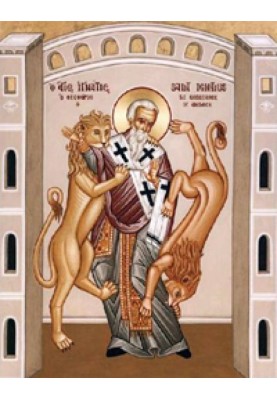Epistles of St. Ignatius the God-Bearer
 Instant download
Instant download
after payment (24/7)
 Wide range of formats
Wide range of formats
(for all gadgets)
 Full book
Full book
(including for Apple and Android)
Ignatius the God-Bearer (died at the beginning of the 2nd century), martyr, one of the Apostolic Men. Very little is known about his life. Eusebius of Caesarea claims that Ignatius the God-Bearer was second, after the ap. Peter, Bishop of Antioch (Ecclesiastical History III, 22). According to St. John Chrysostom, Ignatius the God-Bearer was a “companion of the apostles” (42nd conversation. About St. Ignatius), that is, he either knew them personally or firmly adhered to their tradition. During the reign of Emperor Trajan (98-117), Ignatius the God-Bearer was arrested and taken to Rome, where he was to suffer martyrdom for Christ. Following under escort to the capital, Ignatius the God-Bearer wrote letters to bishops and Christian communities. These letters are, as it were, the testament of the martyr, a confession of his fiery faith and pastoral instruction. Only 7 original letters have survived: to Ephesus, Smyrna, Philadelphia, Rome, Magnesia, Trallia and to St. Polycarp of Smyrna. The messages are available in three editions: “long”, “short” and “medium”. “Medium” is considered the most authentic. As for the martyrdom of Ignatius the God-Bearer, most patrolologists believe that they were recorded no earlier than the 4th century. For biblical science, the messages of Ignatius the God-Bearer are important as one of the earliest evidence about the books of the New Testament. They quote the Gospel of Matthew (Ephesus, 14; Smyrna, 6) and provide sayings that indicate the author’s familiarity with the Gospels of Luke, John and the Epistles of St. Pavel. The letters of Ignatius the God-Bearer prove that the main books of the New Testament were already generally accepted at the turn of the 1st and 2nd centuries.Memory of the Hieromartyr Ignatius the God-Bearer Orthodox. The church celebrates on December 20 and January 29.
Data sheet
- Name of the Author
- Св Игнатий Богоносец
- Language
- Russian












